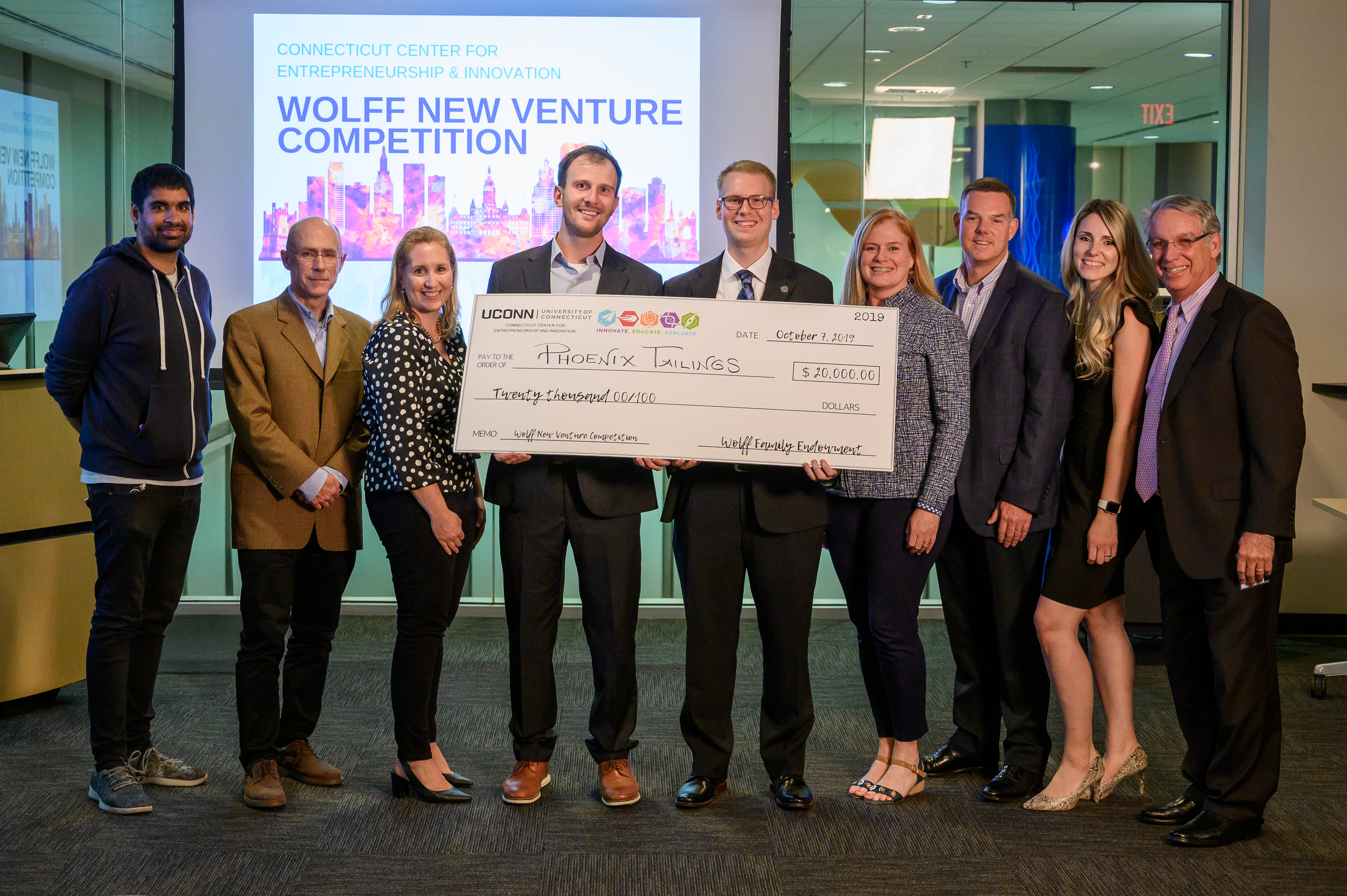A startup that could rid the earth of vast cesspools of toxic sludge won UConn’s annual Wolff New Venture Competition, and a $20,000 prize, on Monday night.
The entrepreneurial competition honors some of the strongest startup programs with a UConn affiliation. All five of the teams that participated have spent at least a year refining and developing their business plans under the guidance of the School of Business’ Connecticut Center for Entrepreneurship & Innovation.
The winner, Phoenix Tailings, is developing a technology that takes hazardous waste materials—so dangerous that to touch them would burn your skin—and extracts valuable metals that are used in electronics, automobiles, defense, and manufacturing.
“Our work is incredibly important,’’ said Nicholas Myers, CEO and co-founder. “If we can be successful, we can fundamentally change these pools and their impact on the regions and the communities where they exist. But we can also be a new source for how companies get raw materials. We envision a day when companies like Ford and Apple are using our materials.’’
What is ‘Red Mud’?
“Red mud” is also known as bauxite tailings or alumina refinery residues. It is a waste product composted iron oxide and other chemicals. For every ton of alumina produced in the manufacture of cars, cell phones and other popular products, another ton of residue is created.
Currently the world produces 120 million tons of this sludge, the volume of Mt. Everest, said Myers. The chemical pools are an environmental hazard. In fact, earlier this year a dam burst at a mine in Brazil, killing hundreds and unleashing an avalanche of red mud that contaminated a nearby water supply. According to environmental group Greenpeace, the nearby Paraopeba River turned dark amber and dead fish floated on the surface.
“Together we’re solving this problem in a way no one has thought of before,’’ said Myers, who founded the company with Michael Martin ’17 (ENG) ’19 MS, vice president of operations. Martin, earned both a bachelor’s and master’s degree in material sciences from the School of Engineering. Phoenix Tailings also has a number of top material scientists as their company advisers.
The $20,000 award money will help Phoenix Tailings to build a prototype of their invention.
“Most of this material that is used in our everyday lives is produced in China, so to be able to source this new supply in the U.S. would be a tremendous economic benefit and decreases our nation’s reliance on materials from another country,’’ Martin said.
The team plans to patent both the technology and the process. Using equipment that is only the size of a portable trailer, they estimate that in the first year of operation alone, they could make $3 million.
Tough Competition
Although Phoenix Tailings won the event, the competition from the other four contenders was strong. Other finalists included:
- Geyser Remediation, a system that eliminates PFAs, likely carcinogens, from municipal drinking water.
- Land Maverick, a company that merges data and robotics to help golf courses improve playing surfaces and operate more efficiently.
- Nami Therapeutics, a company focused on the development of tumor targeting nanotechnologies that give late-stage ovarian cancer patients new treatment options.
- And Levo International, a inexpensive, hydroponic farming venture that can combat hunger in developing countries.
The competition is supported and funded by the Wolff Family. Thomas John and Bette Wolff were strong believers in hard work and entrepreneurship and the competition is in their honor. Their sons Greg and Gary both attended the presentation.
“These five teams together gave the best combined presentation I’ve seen. They did a great job,’’ said Greg Wolff. “What was amazing to me was how practical and useful these startups are to our society, but in vastly different ways.’’
Competition judges included Jeffrey Fyer, CFO of Rallybio; Gyan Kapur, co-founder of Digital Health CT; Alison Malloy, managing director of Connecticut Innovations, and Tim Shannon, a partner in Canaan Partners.
“The Wolff New Venture Competition is the celebration of the five most advanced ventures coming out of UConn this year,’’ said Jennifer Murphy, Connecticut Center for Entrepreneurship & Innovation program director. “These teams have worked with us for a year or more to bridge the gap between business concepts and market entry.’’
While strengthening their businesses, the teams have participated in a variety of entrepreneurial business programs at UConn, including Get Seeded, Accelerate UConn, Innovation Quest, and summer fellowships, paving the way to their launch. It is part of the outstanding business-creation expertise that UConn offers, Murphy said.
“These teams have received mentorship from experienced entrepreneurs, many of them UConn alumni and industry experts,’’ Murphy said. “The Wolff New Venture Competition is very much a part of the pipeline of entrepreneurial activity at the university and has helped many business ideas launch into successful companies.’’



